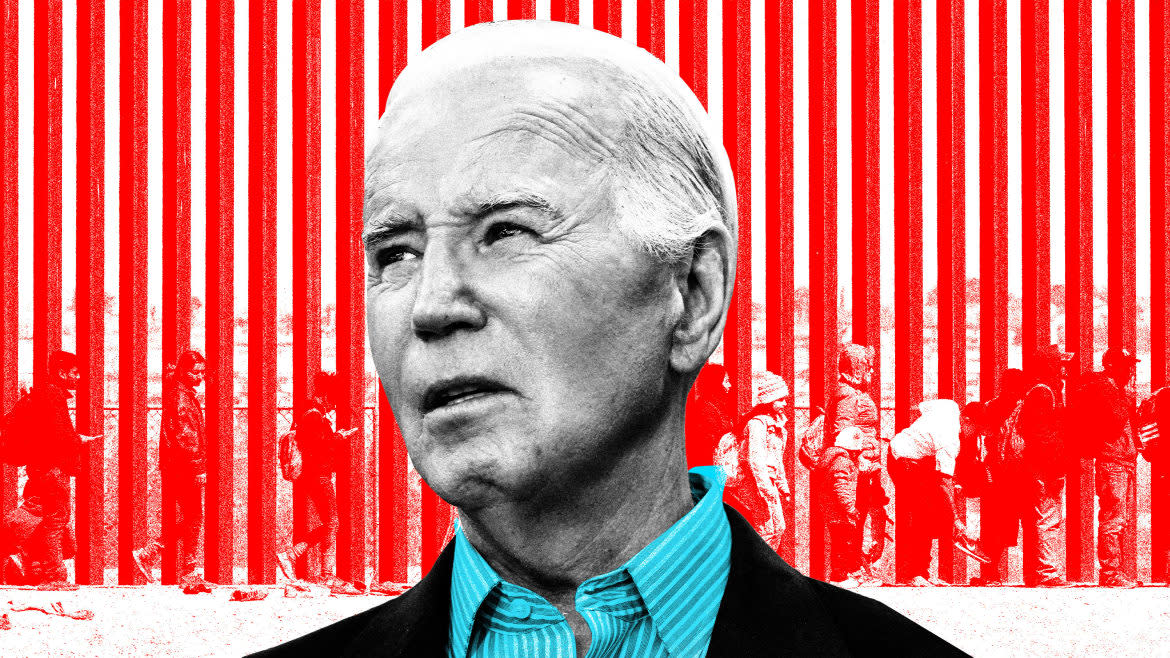Biden’s ‘Illegals’ Gaffe During the State of the Union Was Bad. His Immigration Policies Are Worse.

- Oops!Something went wrong.Please try again later.
- Oops!Something went wrong.Please try again later.
President Joe Biden, during Thursday’s State of the Union address, clearly prioritized reminding the audience that he was not his political opponent, former President Donald Trump. That is, until he made the politically incorrect gaffe heard ’round the world.
“Laken Riley—an innocent young woman who was killed by an illegal,” he said, addressing those who are blaming the recent murder of 22-year-old nursing student Laken Riley on Biden’s lax immigration policies at the border, given that the suspected killer is an undocumented man from Venezuela.
“But how many thousands of people are killed by legals?” he continued. “To her parents, I say, my heart goes out to you—having lost children myself, I understand.
Biden’s SOTU Easily Cleared the Very Low Bar Set for Him by the GOP
Democrats and immigration advocates alike are up in arms over his painfully outdated choice of language, going on talk shows and social media platforms to air their outrage over the fact the president used the term “illegal” to describe an undocumented immigrant, particularly when the Biden administration made a point of removing the term “illegal alien” from government communications at the beginning of his term.
“Manipulating a personal tragedy for political gain in this way is dangerous,” the National Immigrant Justice Center wrote in a post on X, formerly known as Twitter. “Conflating immigration status with criminality is racist and disgusting.”
But as important as language is—and as hurtful as the president’s particular choice of language was at that moment—we should resist the tempting urge to feed the outrage machine, and instead consider what makes immigration illegal in the first place.
As Biden mentioned during his State of the Union address, during his first day in office he signed an Executive Order overturning Trump’s infamous Muslim ban and vowed to put together a task force to reunite separated families. However, he failed to mention that he also deported more than 2,700 Haitian immigrants back to a country deemed too violent for U.S. citizens to visit, and kept pandemic-era policies like Title 42 in place long after they were necessary to protect public health.
He didn’t mention the fact that these policies also separate families and keep people from being able to come to the United States, simply because of where they were born. He didn’t mention the fact that immigration is one of the issues where he has sharply pivoted—or that he is now considering a bill that would make it illegal for anyone to apply for asylum outside of official points of entry.
Trump Now Falsely Claims He Didn’t Endorse Immigration Bill Co-Author
Many immigration activists have pointed out that “no human is illegal,” so why is it that the minute that a human being crosses a border they are suddenly treated like criminals? Sometimes, this functions like SB4—the Texas law that the Supreme Court has temporarily blocked that would allow law enforcement to arrest anyone suspected of crossing the border illegally, without any other charge.
Most of the time, it is being racially profiled—and stopped for what would otherwise be minor misdemeanors, but punished with deportation. While there are certainly criminals like the man who allegedly killed Laken Riley, many of the crimes that get someone deported are broken tail lights, expired registrations, running traffic lights, and small possessions of marijuana.
Of course, it hasn’t always been like this. Once upon a time, not so very long ago—the turn of the twentieth century to be precise—the U.S.-Mexico border was just a line in the sand, marked with concrete blocks. People crossed back and forth freely, but it was the increasing xenophobia in the 1920s—and the way that Mexicans were blamed for the stock market crash of 1929—that led to the first mass deportations, termed “repatriations” at the time.
Even though Mexicans continued to come to the U.S. to work, they faced more and more restrictions—often making it impossible to legally start a life in the United States.
Over time, the border became more and more restrictive—from the concrete wall and chain link fence built to “deter” people from crossing the Sonoran desert, to the deportation centers to punish those who dare defy it.
But throughout history, it has always been laws—specifically, U.S. laws—that made crossing the border illegal. It has never been the people themselves.
Trump Hits Back at Biden’s SOTU With Wacky Snapchat Filters
Rather than getting caught up in a debate over which term is more politically correct to describe someone without papers, we should discuss why people do not have papers in the first place—and what can be done to ensure they do not have to live in fear.
As it stands, our immigration policies have criminalized immigration to the point that 5.5 million U.S. citizen children living in mixed-status households face a very real possibility of one or both of their parents being deported. Asylum seekers wait at our borders after fleeing persecution and economic collapse in countries like Honduras and Nicaragua, only to be treated like political pawns in an election year.
Instead of discussing what can be done to ensure that immigrant families have a pathway to citizenship and that asylum-seekers have a path to safety, we are debating whether to call them “illegal” or “undocumented”—and then turning a blind eye to the way that our policies have functioned to criminalize them.
Get the Daily Beast's biggest scoops and scandals delivered right to your inbox. Sign up now.
Stay informed and gain unlimited access to the Daily Beast's unmatched reporting. Subscribe now.

